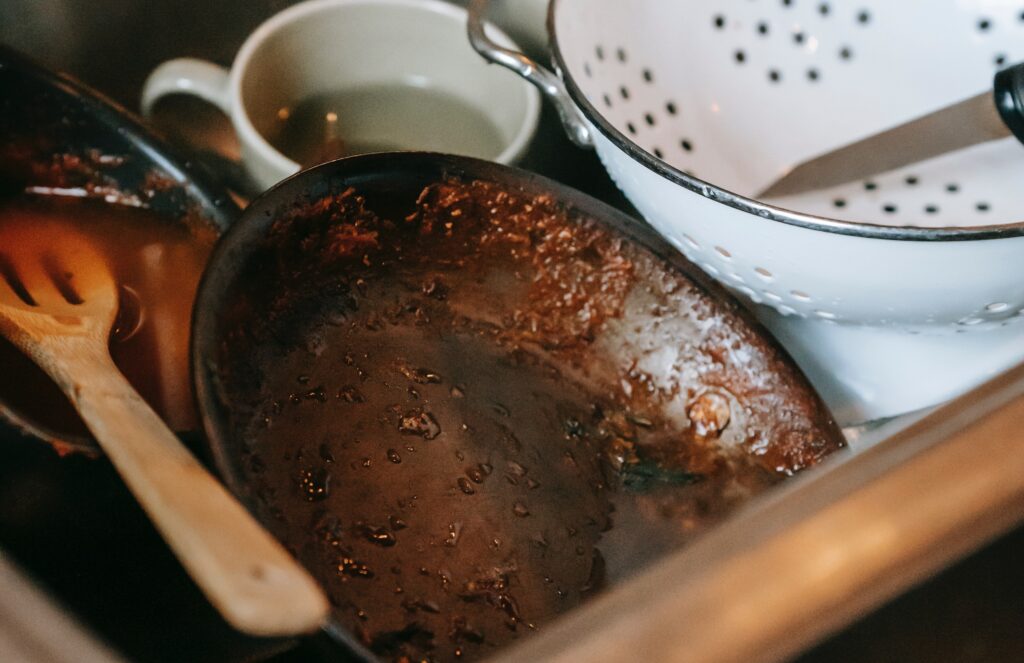By Joseph Staples // SWNS
NEWS COPY W/ VIDEO + INFOGRAPHIC
The average dirty dish lays untouched in the sink for a day and a half, according to a new survey.
The study, delving into the kitchen habits of 2,000 Americans, also found at least half run their dishwasher three times per week and the average person has five items in their freezer that have gone untouched in 2022.
One in four claim deep cleaning the stove or oven is the worst kitchen chore to endure.
Two in five (43%) are likely to invest in customizable bins for their fridge to help store items. Fruits and veggies are most likely to be stored in the crisper (35% and 45%) or a separate bin (30% and 30%).
When it comes to washing dishes, 54% said pots and pans should be washed by hand, followed by fine dining ware (46%), glasses (38%) and coffee mugs (37%).
Yet it’s not enough to stop the 70% who own and use their dishwasher — and sometimes use it to its absolute limit.
Commissioned by LG and conducted by OnePoll, the study also found a universal agreement on where certain things belong to be placed in dishwashers: plates (75%), cutlery and utensils (67%), pots and pans (55%) and fine dining ware (37%) all belong on the bottom rack.
The top rack is saved for coffee mugs (76%), glasses (74%), travel mugs (62%), plasticware (52%) and bowls (43%).
Yet a discrepancy was also revealed between those who prefer to have guests over and those who prefer to be the guests themselves, along with generational and personality types.
Six in 10 (58%) respondents who prefer hosting people in their homes, rather than being a guest, tackle dishes left in the sink in less than a day.
Similarly, 64% of respondents who identified themselves as “minimalists” — known for simple, sparse living — refuse to allow dishes to stack up in the sink for more than a day. “Maximalists” who don’t mind a bit of clutter let dishes stay in the sink for an average of two days.
Over half (56%) of hosts said they love to spend most of their time in the kitchen — either cleaning, cooking or conversing with guests.
Nearly half (49%) of Gen Z believes it’s okay to leave dishes in the sink for one to four days before adding them to the dishwasher, compared to 52% of millennials, 66% of Gen X and 72% of baby boomers who all believe anything longer than a day is too long.
“When it comes to the kitchen, we know that people are passionate about their cooking and cleaning habits,” said Angela Gozenput, Director of Brand Marketing for LG Appliances. “We’re seeing a more relaxed notion around doing dishes and an increase of people trusting their machines to not ruin even their more beloved dishes. Yet there’s still room for controversy on the ‘right’ way to do things.”
The survey also revealed 62% have their personalities reflected throughout their homes, with kitchens taking the spotlight.
For example, 65% of “maximalists” who prefer knick knacks especially take pride in showing their personality and style in their homes.
Those who have a penchant for being guests invited over are more likely to be easy-going: not caring about home styles (19%) and preferring to enjoy the home beyond the heart of the kitchen (35%).
Overall, the most popular personalities for homes tend to be post-modernism (13%), full of thrifted finds (12%) or have a flair of the ever popular mid-century modern (12%).
“Being dubbed the heart of the home, it’s no wonder that people have strong opinions on topics such as how to properly load the dishwasher,” added Angela. “No matter the opinion, we know that there is an appliance that fits each individual’s own unique homestyle.”
Survey methodology:
This random double-opt-in survey of 2,000 naturally representative Americans was commissioned by LG Electronics between October 11 and October 18, 2022. It was conducted by market research company OnePoll, whose team members are members of the Market Research Society and have corporate membership to the American Association for Public Opinion Research (AAPOR) and the European Society for Opinion and Marketing Research (ESOMAR).
